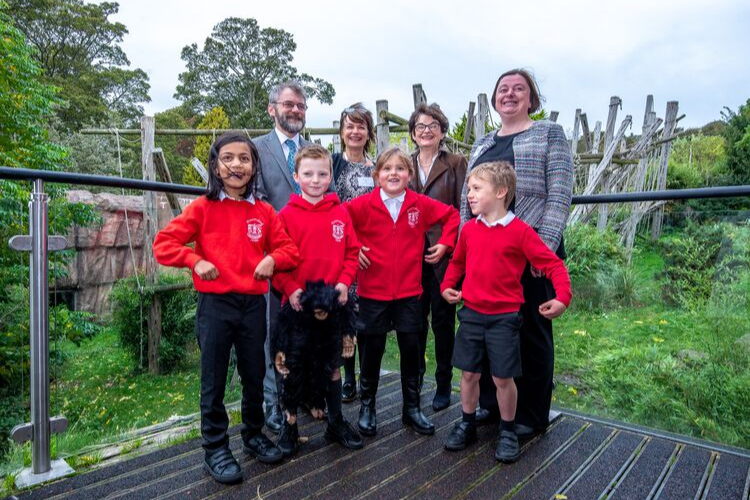World-leading primate complex opens

A new cutting-edge research facility for advancing scientific knowledge on chimpanzee cognition and behaviour officially launched today (Monday 7 October) at RZSS Edinburgh Zoo.
The Budongo Research Unit (BRU), led by the University of St Andrews in partnership with RZSS Edinburgh Zoo, is based at the Zoo’s innovative chimpanzee Budongo Trail enclosure, which allows visitors to see the chimpanzees in the world’s most innovative, interactive chimpanzee complex.
Chimpanzees are one of our closest living relatives, sharing a common ancestor with humans approximately six to seven million years ago. They are a fascinating, intelligent and social species, and by studying how they think, interact and communicate with the physical and social world around them, we can gain vital information about their behaviour and cognition. Understanding chimpanzee minds is an essential component when attempting to reconstruct how our own cognition may have evolved.
The research at the BRU is interactive and entirely voluntary. Chimpanzees are presented with objects, such as a puzzle box or images on a monitor or computer screen, and they learn to manipulate, touch or simply watch the stimuli. Researchers observe and record their behaviour in non-invasive ways using video, eye-tracking technology, computerised recording, touch-sensitive screens and thermal imaging. Using these technologies combined with more traditional methods, researchers can gain valuable insight into how chimpanzees think, learn, communicate and see their physical and social world around them.
St Andrews Principal Professor Sally Mapstone said: “The University of St Andrews is renowned for its leadership on critical global issues and is recognised worldwide for the quality of its teaching and research. Our research collaboration with the RZSS Edinburgh Zoo at the Budongo Research Unit is another example of our scientific community working together to help find the solutions to both current and future global challenges.”
Professor Josep Call, Director of the Budongo Research Unit from the School of Psychology and Neuroscience at the University, said: “The Budongo Research Unit is a state-of-the-art facility that allows us to use the latest technology to investigate the cognition and behaviour of chimpanzees. We study not just one aspect but multiple aspects such as communication, social learning and coordination.
“We study the behaviour of chimpanzees and this comparison is crucial to be able to elucidate how cognition evolves. By studying our closest primate living relatives it can give us clues about how our own cognitive abilities developed.”

Dr Charlotte Macdonald, Director of Conservation and Living Collections at RZSS added: “The Royal Zoological Society of Scotland is at the forefront of conservation and research relating to endangered species. Through collaborative projects such as the Budongo Research Unit we can continue to make global advances for conservation and animals.
“The studies carried out at Budongo enhance our knowledge of chimpanzees and how they interact with the world around them. This information will contribute to the continued protection and conservation of this endangered species and their wild habitats.
“As well as contributing to significant research, the games and puzzles presented add an additional mentally stimulating dimension to the lives of our chimpanzees.”
Dame Anne Glover, President of the Royal Society of Edinburgh (RSE), said: “Scotland’s reputation as a forward-looking innovative scientific nation is globally recognised and deservedly so. This new initiative between RZSS and the University of St Andrews is yet another excellent example of the type of innovation that Scotland brings to the world of science research and I’m sure I’m not alone in looking forward to the findings of the Budongo Research Unit in the future.”
The BRU is an extension of the chimpanzee’s normal enclosure at the Zoo. All research conducted is strictly observational, with each chimpanzee free to choose whether to interact with studies or not.
The BRU welcomes researchers from all over the world, in particular, research members of the Scottish Primate Research Group, a collaboration between several renowned Scottish universities.
Category Research